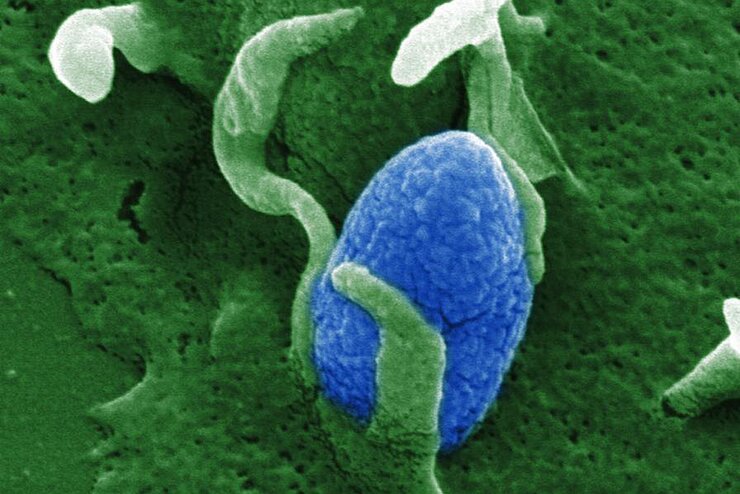Research Foci
The Research Foci are dedicated to answering urgent, clinically relevant questions in infection research. Synergistic cooperation within the Centre, in which all three research topics contribute their expertise, plays a central role. In addition, the Research Foci benefit from the strengths and expertise of the HZI's cooperation partners. They make it possible to meet new challenges arising from rapidly changing pathogens and to integrate new research areas as required.
Antimicrobial Resistance

Increasing occurrence of antimicrobial resistance is a severe challenge, particularly in the light of the scarcity of new candidates in drug discovery. Scientists in the research focus AMR combine expertise in various fields and long-standing experience in industry or industrial-academic collaborations to address these challenges, pursuing a multi-pronged strategy. They investigate the molecular mechanisms causing resistances and explore innovative strategies against pathogens, in particular by identifying and optimizing novel anti-infective compounds.
The most important questions that scientists in RF AMR want to solve are:
- Can antimicrobial resistance be detected early enough to take countermeasures in time?
- How can we find novel drugs against resistant pathogens?
- Can we optimize treatment regimens and use approved antibiotics more effectively?
- How can antimicrobial compounds reach their targets more efficiently?
Speaker RF AMR: Prof. Olga Kalinina
Deputy Speaker RF AMR: Prof. Susanne Häußler
Microbial Communities

Research Focus MICO combines expertise to characterize and influence the complex interactions between pathogens, the immune system and the microbiota - the entirety of commensal bacteria living in the gut and other parts of the human body. This includes innovative approaches for profiling microbes (like RNA-based technologies, the establishment of complex host-microbe interaction models, and single-cell analyses).
Key questions addressed by RF MICO include:
- How does the microbial population in the human body, e.g. in the gut, develop?
- How does it influence susceptibility and resistance toward infections?
- How do commensal and pathogenic microbes communicate with each other and their host?
- Which microbial species are essential for the proper function of the gut?
- How can we prevent damage to the microbiota or restore its function?
- How can we exploit the microbiota to discover new functional RNAs and proteins?
Speaker RF MICO: Prof. Jörg Vogel
Deputy Speaker RF MICO: Prof. Till Strowig
Chronic viral infections

Chronic viral infections by hepatitis and herpes viruses are causing a severe global disease burden. Recently, effective treatment for hepatitis C virus (HCV) infections has become available, but it is challenging to deliver it to all in need. Cytomegalovirus (CMV) therapies are limited by side effects and viral resistance. Vaccines are still lacking for both HCV and CMV, and the understanding of basic mechanisms of pathogenesis, immune control and viral evasion are incomplete.
The research focus CVIR dissects principles that are responsible for the establishment of chronic infections with HCV and CMV and studies mechanisms of immune control and viral evasion.
The most important questions for scientists in RF CVIR are:
- Which viral and cellular factors determine the course of infection and what is their mechanism of action?
- Which antibody-based mechanisms protect from chronic infections?
- How do HCV and CMV evade, diminish or exploit these mechanisms?
- Which vaccination approaches induce protective immunity?
Speaker RF CVIR: Prof. Melanie Brinkmann
Deputy Speaker RF CVIR: Prof. Dagmar Wirth
Individualized immune interventions

Effective therapies and vaccines are still missing for many pathogens. This is particularly true for vulnerable individuals that are at high risk for severe forms of infection or poor responders to interventions. Thus, the research focus INDI has established experimental and clinical activities to fill the knowledge gaps and develop immune-based approaches to prevent or treat resilient infections in high-risk patients. This research contributes to a better understanding of host responses to infections and vaccinations.
The most important questions for RF INDI are:
- Why do individuals respond so differently to infections, vaccinations and treatments? What is the contribution of hereditary traits, and what is environmentally dependent?
- How can studies of vulnerable individuals be used to develop novel immune-based interventions?
- Which parameters predict the efficacy of immune responses?
- How to design vaccines and immunotherapies to increase their efficiency of immune protection in vulnerable individuals and populations?
Speaker RF INDI: Prof. Jochen Hühn
Deputy Speaker RF INDI: Prof. Markus Cornberg
Digital and Global Health

Research Focus EPI – short for “Epidemiology” – deals with infectious diseases at the level of populations and develops solutions for public health. The HZI-coordinated development of the Surveillance Outbreak Response Management and Analysis System SORMAS is already contributing to the response to epidemics in Africa. It will improve the understanding of the spread of infectious diseases. HZI will also intensify development of Mobile Health or “mHealth” technologies utilizing mobile electronic devices for infection research. Within the German National Cohort and beyond, these applications will deepen our knowledge on associations between infections and non-infectious diseases.
The most important questions scientists in RF EPI work on are:
- How can we improve global health security and pandemic preparedness?
- How can applications for digital and mobile devices enhance prevention, treatment and rehabilitation of infections?
- Which causal associations between infections and non-infectious diseases exist – and can they offer novel control approaches?
Speaker RF EPI: Dr Stefanie Castell
Acting Deputy Speaker RF EPI: Dr Berit Lange
Infection and Neurodegeneration

Infections and inflammatory processes can also affect the central nervous system (CNS). However, the understanding of the interaction between the immune system and the nervous system is still far from complete.
The Research Focus "Infections and Neurodegeneration" (INEU) is harnessing interdisciplinary research approaches to characterize the complex interactions between pathogens, (neuro-) inflammation and brain function.
INEU aims to elucidate the mechanisms of pathogen control within the CNS and the role of infections in the onset and progression of age-related neurodegenerative diseases such as Alzheimer's or Parkinson's disease. The Research Focus is in close cooperation with experts from TU Braunschweig, MHH and DZNE. In addition, the influence of the intestinal microbiota as well as the metabolic balance (homeostasis) on processes in the CNS is being investigated. The findings will contribute to the discovery of early detectable biomarkers for neurodegenerative diseases and the development of personalized therapies.
The most important questions for the Research Focus INEU are:
- What role do infections and associated inflammatory processes play in the onset and development of neurodegenerative diseases?
- How do metabolic imbalances affect such neurodegenerative diseases?
- How does the individual microbiota influence processes in the CNS?
- Which biomarkers can be detected in the early stages of a neurodegenerative disease?
- What are the possible therapeutic approaches and personalized preventive measures for each individual patient?
Speaker of the RF INEU: Prof. Ulrich Kalinke
Deputy Speaker: Prof. Martin Korte
Respiratory Viral Infections

The spread of the coronavirus SARS-CoV-2 strikingly illustrates the global health threat posed by respiratory viral infections. Even before the Covid-19 pandemic, viruses affecting the human respiratory system have caused several global disease outbreaks, such as the annual influenza epidemic.
HZI's Research Focus RVIR investigates infections caused by the influenza A virus, corona viruses such as SARS-CoV-2 and the respiratory syncytial virus (RSV). Together with university partners, HZI scientists identify risk factors and markers for severe forms of these infections. Another focus is on co-infections, i.e. cases in which the host organism has to fend off both bacteria and viruses.
HZI researchers use the insights gained on these types of infection to explore novel approaches for diagnostics and interventions. They develop antibody and drug-based therapies as well as vaccination strategies. Using bioinformatics and experimental methods, they identify and validate predictive biomarkers and develop recommendations for optimizing seasonal vaccines. For this purpose, new digital health tools for monitoring disease outbreaks are developed and combined with mathematical modelling.
The most important questions for the Research Focus RVIR are:
- How can the spread of emerging pathogens with pandemic potential be predicted?
- How can outbreaks of viral respiratory infections be controlled and contained?
- What novel prevention and treatment methods are effective against respiratory viruses?
Speaker of the RF RVIR: Dr. Antoine-Emmanuel Saliba
Deputy Speaker: Prof. Dunja Bruder
